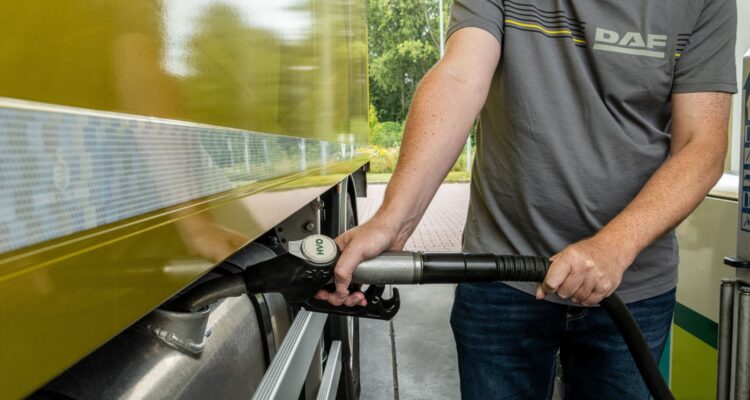In the ever-evolving landscape of zero-emission trucking, Hydrotreated Vegetable Oil (HVO) emerges as a remarkable solution, playing a pivotal role in decarbonizing operations for forward-thinking operators. HVO, derived from vegetable oil, tallow, or used cooking oil, stands out as an odourless, non-toxic, drop-in biofuel that’s completely fossil-free, requiring no engine or infrastructure modifications.
Tailored for the latest Euro VI trucks, HVO boasts a significantly lower carbon footprint compared to traditional diesel, slashing CO2 emissions by a staggering 90%. An exemplary case is Wincanton, where approximately 85% of their logistics vehicle fleet, serving Screwfix, now relies on HVO, consuming about 90,000 Liters of this eco-friendly fuel per week. The logistics specialist initiated an HVO trial in 2022 with 48 heavy goods vehicles based at the Screwfix distribution centre in Lichfield, Staffordshire. To ensure compatibility, Screwfix collaborated with their truck manufacturer and installed dedicated fuel tanks at their Distribution Centres, with vehicles in the Stafford Distribution Centre transitioning to HVO in March this year.
Ian Howe, Supply Chain and Logistics Director at Screwfix, emphasized their commitment to reducing emissions and improving air quality across their extensive network of over 870 stores in the UK and Ireland. He expressed satisfaction with the encouraging results and a determination to explore further possibilities.
In another inspiring example, Royal Mail has integrated 5,000 electric light commercial vehicles into its final-mile fleet. Yet, HVO adoption is proving to be an invaluable supplementary measure in enhancing the environmental performance of their heavier trucks. Several Royal Mail sites, including Sheffield mail centre, Midlands super hub, and Manchester vehicle operating centres, have already transitioned their trucks to HVO, with plans for four more locations to follow suit. This strategic move is anticipated to save a remarkable 2.1 million Liters of diesel this year, as Royal Mail strives to achieve net-zero carbon emissions by 2040. Their commitment extends to expanding HVO deployment across their distribution fleet network, with a potential reduction of up to 200,000 metric tons of CO2e in direct emissions.
 Rob Fowler, Fleet Director at Royal Mail, views HVO as a transitional fuel that aids their journey toward decarbonizing their HGV fleet, while they continually evaluate emerging low-emission technologies such as electric and hydrogen HGVs.
Rob Fowler, Fleet Director at Royal Mail, views HVO as a transitional fuel that aids their journey toward decarbonizing their HGV fleet, while they continually evaluate emerging low-emission technologies such as electric and hydrogen HGVs.
Meanwhile, PepsiCo, in partnership with AB Texel UK, has achieved a remarkable feat by powering the transportation of 240,000 tonnes of potatoes annually from British farms to its Walkers Crisps site in Leicester entirely with used cooking oil-derived HVO. This initiative spans 2.6 million kilometres of truck journeys, consuming 800,000 Liters of HVO fuel and reducing greenhouse gas emissions by an estimated 5,000 tonnes annually. PepsiCo’s commitment extends to expanding HVO fuel usage to their transport operations in Scotland later in 2023, further contributing to emissions reduction.
Simon Devaney, Sustainability Director at PepsiCo UK & Ireland, highlighted the significant role played by HVO fuel in accelerating the decarbonization of their transport activities. By the end of 2023, PepsiCo aims to utilize HVO to power approximately nine million kilometres of their journeys across the UK.
Even smaller-scale operations, like heating and plumbing company TG Lynes, have embraced HVO, incorporating it into two of their 18-tonne Euro VI trucks, leading to an estimated 15-tonne carbon saving in 2023. Transport Supervisor John O’Connell noted the unexpected benefits, including improved mileage per gallon (MPG), as these vehicles operate on shorter routes with frequent stops and starts. TG Lynes is now considering expanding HVO usage across their entire fleet.
Suttons Tankers, based in St Helens, has embarked on an eight-week HVO trial as an alternative fuel for their diesel engines, with the goal of reducing CO2 emissions by 91 tonnes on five select routes. Their commitment aligns with the aspiration to achieve net-zero emissions by 2040, demonstrating a clear focus on sustainability and environmental responsibility.
While battery electric and hydrogen technologies offer promising avenues for decarbonization, especially for hauliers with renewal plans on the horizon, HVO emerges as a practical solution for reducing emissions on existing fleets. The UK, however, faces the challenge of developing HGV-specific infrastructure to support zero-emission vehicle recharging and refuelling. In the interim, alternative fuels like HVO offer a valuable bridge towards a greener future.



















